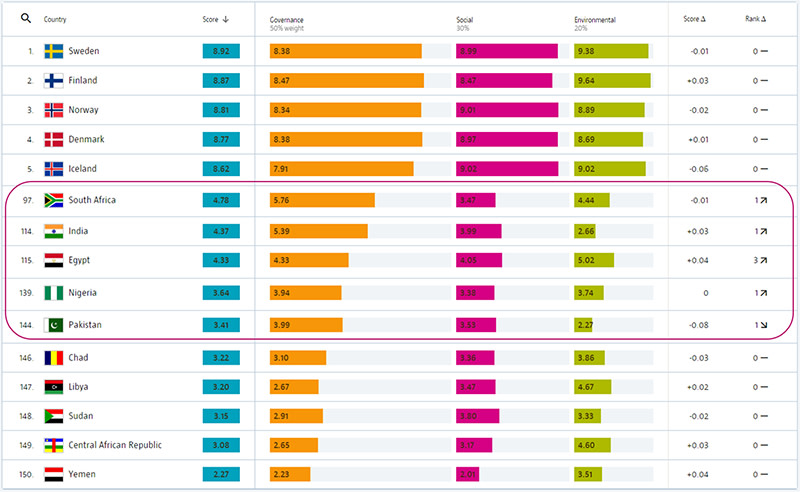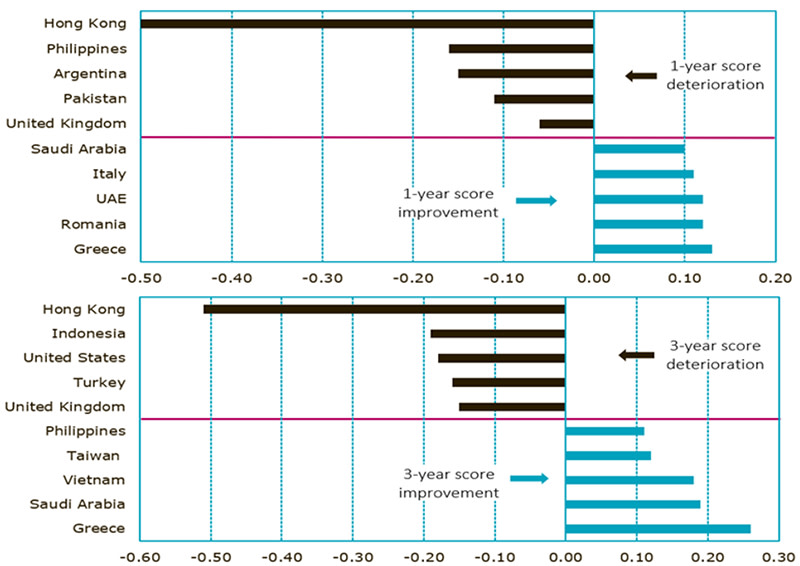Country sustainability visibly harmed by Covid-19

Speed read
- Pandemic shows how sustainability is crucial for ability to cope
- Nordic nations led by Sweden top the biannual rankings again
- Two countries singled out for facing climate policy headwinds
The bi-annual report shows that some nations have gone backwards on their environmental, social and governance (ESG) credentials as the pandemic ravaged economies and their abilities to cope with the human and economic aftermath of mass infections.
It also explains how the north-south sustainability divide in Europe highlighted in the January 2021 report has extended with the pandemic into an east-west divide as well. The richest countries in northern and western Europe continue to rank higher than their counterparts in the south and east of the continent. The worst European performers are the Balkans.
Sweden retains No. 1 spot
The Nordic nations continue their dominance at the top of the rankings, led by Sweden, which has consistently been named as the world’s most sustainable country in the 21-year history of the CSR. Sweden is followed by Finland, Norway, Denmark and Iceland.
New Zealand in 7th place is the highest ranked country outside Europe. Of the 23 developed nations covered by the 150 countries surveyed, 20 belong to the top-tier ESG categories, with Greece, Italy and Spain as outliers in the medium tier.
Of the 127 emerging markets covered, only nine made it into the second-best category, led by Singapore. The bottom nations are the ‘usual suspects’ of countries in Africa which are embroiled in wars, led by Yemen, the Central African Republic and Sudan. South Africa (97), India (114), Egypt (115), Nigeria (139) and Pakistan (144) are the lowest-ranking countries in which it is possible to invest.

The magnitude of Covid
“With Covid-19 still raging in many parts of the world, the magnitude of its effects will not be fully known for some time,” says SI Country Specialist Max Schieler, author of the report. “At this stage it is obvious that the pandemic has already had a very severe impact in a wide range of areas, reversing years of progress on poverty reduction and other areas of human development.”
“It has revealed and worsened some enduring fault lines such as extreme inequality, underlying disparities in health care, education, and social welfare, as well as simmering social and political tensions. While advanced economies have been able to mitigate the dire economic consequences by massive fiscal support and monetary stimulus, less-developed nations did not have the necessary financial means to shelter their citizens from the economic hardship in the same way.”
“As a result, widespread discontent has bubbled up and a wave of social unrest is sweeping around the globe, from Brazil and Chile to Colombia and South Africa, just to name but a few. In view of the ongoing Covid-19 induced humanitarian and economic stress, increasing disparities and eroding social cohesion, there is a significant likelihood that civil unrest and political instability will continue, with the resulting ramifications for the economic and country sustainability landscape.”
Blows to combatting climate change
One welcome effect of the pandemic was that global energy-related CO2 emissions fell by 5.8%, the largest percentage decline since World War II, according to the IEA. But there remain problems in getting governments to implement the emissions reductions needed to meet the Paris Agreement, as highlighted in two special reports on Switzerland and Australia.
“Switzerland’s policy on fighting climate change received a severe blow after a narrow majority of 51.6% of voters rejected a proposed CO2 law in a referendum on June 13,” Schieler says. “The law envisioned various measures on a ‘polluter pays’ principle, including increased taxes on car fuel and air tickets. The defeat resulted from a combination of various factors, including disinformation and fears about rising living costs, and comes at a time when people are already burdened by Covid-19.”
Australia, meanwhile, is seemingly ignoring the extreme weather events that have plagued the country in recent years, such as bushfires, droughts and flooding. “The economy is heavily dependent on fossil fuels and is one of the world’s biggest exporters of coal, which might explain the government’s unwillingness to implement more tangible measures,” says Schieler.
“However, the cost of inaction is likely to increase in the coming years. A recently released report from the Climate Council finds that the cost of extreme weather has more than doubled since the 1970s and amounted to AUD 35 billion over the past decade. By 2038, these costs could increase to even AUD 100 billion every year.”
China syndrome
Countries and territories move up and down the rankings according to how well they deal with the ESG factors covers by the survey. Hong Kong suffered the biggest drop over the past year and past three years, due to China’s increasing interference in the territory and the implementation of the national security law. Greece saw the biggest gain over both timescales as it continues to benefit from the reforms introduced following its financial crisis of 2009.

Also among the winners is, somewhat surprisingly, Saudi Arabia, after a rise in the retirement age for women, which positively impacted gender equality and aging indicators, as well as some other small reforms for everyday life. “This should not obscure the fact that the country does still display grave deficiencies in terms of inequality, personal freedom and human rights,” says Schieler.
A noticeable anomaly is the US, whose persistently disappointing sustainability performance during the Trump presidency has caused it to drop out of the top 20. From a rank of 18th at the start of the Trump administration, the country now ranks 21st, with a weakening performance in all three ESG dimensions.
“Still, with the inauguration of the Biden administration in January, and the change in direction in various policy areas including rejoining the Paris Agreement, there is a reasonable chance for this decline to come to a halt, or even be reversed over time,” Schieler says.
Sign Up Now for Full Access to Articles and Podcasts!
Unlock full access to our vast content library by registering as an institutional investor .
Create an accountAlready have an account ? Sign in
